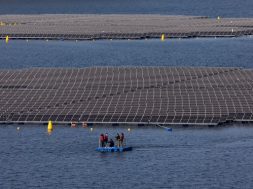
Singapore Looks to Power Up Electric Vehicle Charging Network
Transport authority announces plans to co-fund installation costs of 2,000 electric chargers at private residences, of up to SG$4,000 ($2,959) per charger.
Singapore is powering up efforts to expand its charging network for electric vehicles (EVs) with offers to co-fund installation costs of such systems in private residences across the island. These grants will offset up to SG$4,000 ($2,959) per charger and for 2,000 EV chargers.
The EV Common Charger Grant aims to drive the country’s goal of rolling out 60,000 charging points in the next 10 years, including 20,000 in private premises and 40,000 in public carparks.
Announced Monday by the Land Transport Authority (LTA), the scheme is available to non-landed private residences such as condominiums and excludes hotels, hostels, and serviced apartments. The government agency noted that these private properties accounted for a significant portion of residences in Singapore and would play an important role in improving the national charging network.
Applicants of the grant can be either EV charging operators or owners of the non-landed property, such as the management corporation of a strata-titled development.
Grants cover upfront costs of three components in the implementation of EV chargers, namely, the charging equipment, licensed electrical worker fees, as well as the cabling and installation cost, which is capped at SG$1,000. The funds will offset half the cost of these three components, up to SG$4,000 in total per charger.
LTA added that only systems with smart charging functions, which facilitated the monitoring of power consumption and reactive adjustments to the rate of charging, would be approved for the grants. This aimed to drive the adoption of systems that enabled better energy planning and more efficient electricity consumption, the land authority said.
In addition, to drive the early rollout of chargers to as many properties as possible, grants would only go towards the funding of chargers for up to 1% of residential parking lots within each private residence.
Applications for the grants will open from July 29 when they will be assessed on a first-come, first-served basis, and will remain available until December 31, 2023, or when 2,000 chargers have been approved for co-funding.
Selection criteria for the grants include systems that are installed only after July 19 and upon receiving approval from LTA, chargers that are installed in common areas that are accessible to residents, and charging systems that are able to monitor and record power consumption as well as timestamp of consumption.
According to Minister for Transport S. Iswaran, just under one million vehicles ply Singapore roads today, all of which the government hopes to have running on cleaner energy by 2040.
Heavy vehicles, in particular, make up less than a tenth of the country’s vehicle population, but contribute nearly half the carbon emissions at 3 million tonnes, said Iswaran, who was speaking at the launch of SembWaste’s fleet of 24 electric waste collection trucks and EV charging hub of 18 points.
Electrification of vehicles could slash emissions and ambient noise by at least half, the minister noted. Singapore’s total carbon emissions on the road clock at 6.4 million tonnes.
From 2023, the government itself would procure only new cars that ran on cleaner energy, he said, with all government cars to run on such energy by 2035.
Iswaran said: “Over the next two decades, the shift to EVs will gather significant momentum as prices fall, and as a greater variety of models become available. The entire value chain must adapt to this transition–from vehicle sales and engineering, to charging infrastructure and user behaviour.”
The government, he added, had made efforts to bring down upfront costs through incentive schemes and expand the charging infrastructure. It also was focusing on regulations, giving LTA new statutory functions to govern EVs and EV charging. These included the establishment of technical standards for chargers, which would be effective from July 29 this year.
The transport minister also unveiled that a regulatory sandbox had been set up to assess standards for newer fixed EV charging systems, such as high-powered chargers and swappable batteries for electric motorcycles. LTA would review, alongside industry players and technical experts, the potential inclusion of these evolving systems in the local charging standard, called Technical Reference 25 (TR25).
He added that LTA had been in contact with companies to submit specific sandbox applications for case-by-case assessment and establish detailed operating conditions. For example, a sandbox had been launched for Tesla’s V3 Supercharging system, which was touted to cut charging times to 15 minutes.
Local shopping mall Orchard Central announced Monday that it had installed three of these Tesla charging systems on the ninth level of its car park, opening it for public use 24 by 7.
According to Tesla, there are more than 2,500 Supercharger stations with 25,000 Superchargers deployed worldwide.
Slated to be completed by year-end, Iswaran said the TR25 review would enable Singapore to deploy a charging network on a “safe and future-ready foundation”.
“We have seen some early progress in the development of charging infrastructure in private premises, which account for one-third of the roughly 2,000 charging points in Singapore today. However, most of these are in commercial developments like shopping malls,” he said, stressing the need to drive the rollout of shared chargers in non-landed private residences.


















